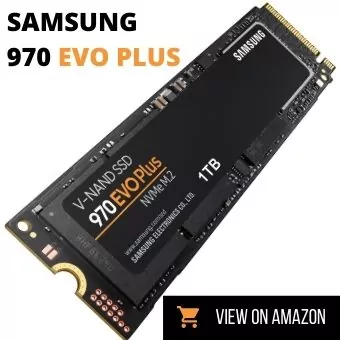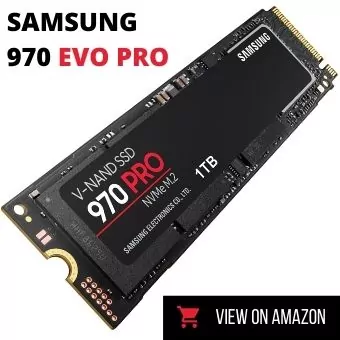If you are a gamer, tech-enthusiast, or looking to build up a working station, Samsung M.2 NVMe SSDs shall serve you well. Not only is Samsung a global, cult-inspiring tech giant, but it also has a significant footing in the domain of Storage Devices. It offers a wide range of SSD devices and is a reputed and reliable brand.
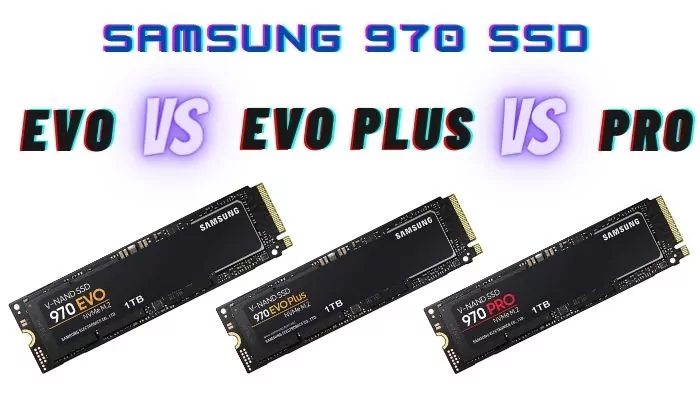
While you don’t have a plethora of choices as far as Samsung M.2 SSDs go by, you still have a few options. At the forefront of these options is Samsung’s former flagship 970 series. It came out in November 2019 and includes:
- Samsung 970 EVO NVMe M.2 SSD
- Samsung 970 EVO Plus NVMe M.2 SSD
- Samsung 970 PRO NVMe M.2 SSD
Differentiating between these 3 products is an irksome and tiresome process. What doesn’t help, either, is that companies tend to exaggerate sequential read and write speeds. I, by no means, intend to insinuate that Samsung is an uncredible brand. It’s just that more often than not, user-tested specifications fall short of company-listed specifications.
So, how do these 3 Samsung M.2 SSDs with PCIe interface stack up against one another? The gist of this article is to address this very question. In order to so, we tested 1 TB version of 970 EVO, 970 EVO Plus, and 970 Pro and compared them on the basis of company-listed specifications, user-tested specifications, and pricing.
Samsung 970 Series Comparison
Note: The values listed below are for 1 TB versions of 970 EVO, 970 EVO Plus, and 970 Pro. These may vary for other versions. On mobile devices, swipe right or tilt your phone to view the table below.
| Benchmark | 970 EVO | 970 Pro | 970 EVO Plus |
|---|---|---|---|
| Image | 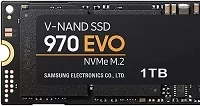 | 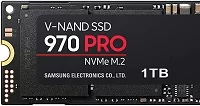 | 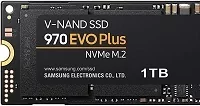 |
| Interface | PCIe Gen 3.0 x 4, NVMe 1.3 | PCIe Gen 3.0 x 4, NVMe 1.3 | PCIe Gen 3.0 x 4, NVMe 1.3 |
| Form Factor | M.2 (2280) | M.2 (2280) | M.2 (2280) |
| NAND Flash | Samsung V-NAND 3-bit MLC | Samsung V-NAND 2-bit MLC | Samsung V-NAND 3-bit MLC |
| Cache Memory | 1 GB LPDDR4 DRAM | 1 GB LPDDR4 DRAM | Samsung 1GB Low Power DDR4 SDRAM |
| Terabytes Written | 600 TBW | 1200 TBW | 600 TBW |
| Storage Options | 250 GB, 500 GB, 1 TB and 2 TB | 500 GB and 1 TB | 250 GB, 500 GB, 1 TB and 2 TB |
| Management Software | Samsung Magician | Samsung Magician | Samsung Magician |
| Power | 6 W | 5.7 W | 6 W |
| Warranty | 5 years | 5 years | 5 years |
| Buy Now | Check Price on Amazon | Check Price on Amazon | Check Price on Amazon |
Form Factor and Interface
There are numerous similarities between 970 EVO, 970 Pro, and 970 EVO Plus. The most significant of these are form factor and interface. All of these SSDs have M.2 2280 form factor and PCIe Gen 3.0 x 4, NVMe 1.3 interface. Thanks to the M.2 2280 form factor, your PC case will remain uncluttered regardless of your choice of model. All of these SSDs are embedded in Samsung Phoenix Controller, which plays an integral part in delivering brisk read and write speeds.
NAND Technology
All of these models use V-NAND technology – a non-volatile flash memory in which memory cells are clustered vertically to utilize minimal space and allow high-speed read and write operations. Samsung 970 EVO Plus is powered by fifth-generation V-NAND technology that uses 96-layer 3D NAND Flash memory chips. For context, 970 EVO uses 64-layer 3D NAND Flash Memory chips. This should explain the difference in performance between the two storage devices.
Endurance
For SSDs, Endurance is measured in Terabytes Written (TBW). It is a measure of the number of Terabytes that you can cumulatively write onto your SSD over its lifetime. Both 970 EVO and 970 EVO Plus have a Terabytes Written value of 600 TBW. For context, if you were to write 100 GB of data to your SSD every day, you would need 6000 days (roughly 16 years) to exhaust this volume! 970 Pro is measured at 1200 TBW, so just double the years (😲 😲 😲)!
Storage
Samsung 970 EVO and Samsung 970 EVO Plus are available in 250 GB, 500 GB, 1 TB, and 2 TB capacity options. Your choice, however, is limited if you are intending to buy Samsung 970 Pro. It only comes in 2 options- 500 GB and 1 TB. It is worth noting that as capacity increases, the price goes up, but the price per GB falls! Hence, having twice as many options as 970 Pro gives 970 EVO and 970 Plus a competitive edge over 970 Pro.
Working Conditions and Warranty
Both, Samsung 970 EVO and 970 EVO Plus consume 6 Watt of power, while 970 Pro consumes 5.7 W. All of these have the same thermal guard (Samsung’s Dynamic Thermal Guard) for maintenance of temperatures within a certain range (0 – 70 ℃). Samsung also enables you to keep track of SSD performance by virtue of its ‘Magician’ software. By using Samsung Magician, not only can you monitor drive health and speed, but you can also boost performance.
As far as warranty is concerned, all of these 3 SSDs have a 5-Year limited warranty or TBW Limited Warranty (600 TBW for 970 EVO and 970 EVO Plus, and 1200 TBW for 970 Pro).
Up until now, we have compared specifications and attributes for 3 models of the Samsung 970 Series. All of the above-mentioned attributes are important metrics because these ultimately impact the performance of the Storage Device. At the end of the day, what really matters is performance.
Performance
Note: The values listed below are for 1 TB versions of 970 EVO, 970 EVO Plus, and 970 Pro. These may vary for other versions.
| Benchmark | 970 EVO | 970 Pro | 970 EVO Plus |
|---|---|---|---|
| Sequential Read Speed (*CL) | 3400 MB/s | 3500 MB/s | 3500 MB/s |
| Sequential Write Speed (CL) | 2500 MB/s | 2700 MB/s | 3300 MB/s |
| Random Read Speed (4 KB, QD1) (CL) | 15000 IOPS | 15000 IOPS | 19000 IOPS |
| Random Read Speed (4 KB, QD32) (CL) | 500,000 IOPS | 500,000 IOPS | 600,000 IOPS |
| Random Write Speed (4 KB, QD1) (CL) | 50,000 IOPS | 55,000 IOPSs | 60,000 IOPS |
| Random Write Speed (4 KB, QD32) (CL) | 450,000 IOPS | 500,000 IOPS | 550,000 IOPS |
| Sequential Read Speed (**Avg) | 2316 MB/s | 2352 MB/s | 2369 MB/s |
| Sequential Write Speed (Avg) | 2133 MB/s | 2074 MB/s | 2175 MB/s |
| 4K Random Read Speed (Avg) | 59.9 MB/s | 52.2 MB/s | 61.5 MB/s |
| 4K Random Write Speed (Avg) | 146 MB/s | 152 MB/s | 147 MB/s |
| Sustained Write Speed (Avg) | 1306 MB/s | 1894 MB/s | 1544 MB/s |
In this portion of the article, we will be comparing company-listed specifications and actual user-tested specifications for 970 EVO, 970 PRO, and 970 EVO Plus. Having already mentioned benchmarks, we will be adopting a rather unconventional (yet interesting approach) here, whereby we will compare 2 products, and compare the winner with the 3rd product.
Samsung 970 EVO vs 970 EVO Plus
As you can see in the table above, the advertised Read and Write Speeds for 970 EVO and EVO Plus are 3400/2500 and 3500/3300 Mb/s respectively. That’s where Samsung’s “53% faster than the 970 EVO” claim for EVO Plus seems to substantiate. In actual user-tested performances, the contrast isn’t as stark. Sure, EVO Plus is marginally faster than EVO, but the differences are almost negligible.
The only area in which EVO Plus absolutely dwarfs EVO is Sustained Write Speeds. Sustained Write Speeds are a measure of sequential write speeds over a 60-second continuous interval.
So, we do have a winner! On a purely performance basis, Samsung 970 EVO Plus edges out Samsung 970 EVO.
Samsung 970 EVO Plus vs 970 Pro
As apparent from the table above, Samsung 970 EVO Plus is the superior M.2 SSD. 970 Pro does offer a 23% boost on Sustained Write Speed over EVO Plus, but that’s just about it. It struggles to compete across other domains, conceding heavily in Sequential Read and Write Speeds.
Hence, in the battle of Samsung 970 EVO vs 970 EVO Plus vs 970 Pro, we have a clear winner: 970 EVO Plus!
Value
As far as SSDs are concerned, value is measured by GB/ Dollar. The higher this value, the better! Due to fluctuating market rates due, we won’t be able to cite absolute values. Hence, we will be comparing them relatively.
Samsung 970 EVO offers the best value. It is reasonably priced and budget-friendly. It is followed by Samsung 970 EVO Plus, which comes at a slight premium. Given the performance boost, you’d expect that. What you won’t expect, however, is an ‘almost absurd’ price tag on Samsung 970 Pro. For the price of one 970 Pro, you can buy two 970 EVO and a decent lunch!
Verdict
By now, we have compared almost all specifications and performance benchmarks for Samsung 970 EVO, Samsung 970 EVO Plus, and Samsung 970 Pro. So, the question is “Which one of these SSDs is the best for you?”
Well, before I take sides, I would like to reiterate that all of these SSDs are unbelievable in their own right-especially 970 EVO and 970 EVO Plus. While some provide better performance, others offer better value per dollar. All in all, you won’t regret buying any one of them. If you still want my nonsensical opinion, here it is:
The smart way to go about such decisions is to consider your needs. Most average users, for example, won’t mind the minimalistic performance gap between the 3 SSDs. If you are one such user, don’t look beyond Samsung 970 EVO. It offers the best value per dollar and is comparable to 970 EVO Plus in almost all aspects.
On the other hand, if you are building a PC for gaming or Content Creation, you will savor the minor performance gains that come your way thanks to Samsung 970 EVO Plus. Specification-wise, it is the best SSD of the lot!
As far as Samsung 970 PRO is concerned, it disappoints with its astronomic price tag. Without a shadow of a doubt, Terabytes Written value of 1200 TBW (2x TBW of 970 EVO) and Average Sustained Writing Speed of 1894 MB/s (23% boost over 970 EVO Plus) are huge gains but fade in comparison to the hefty premium that you will need to pay to acquire one of these. That having been said, it is the most reliable and least likely to fail.

